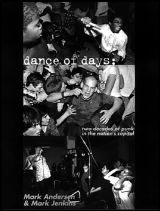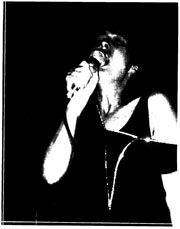DANCE OF DAYS: TWO DECADES OF PUNK IN THE NATION’S CAPITAL
by Mark Anderson and Mark Jenkins, (Soft Skull Press, $20 )
SPINNING BLUES INTO GOLD: THE CHESS BROTHERS AND THE LEGENDARY CHESS RECORDS
by Nadine Cohodas (St. Martin’s Griffin, $14.95 )
BAD BRAINS would’ve come across like space-alien freakos no matter where they played. In 1979, the Washington, D.C. band was pure, blinding energy that just happened to be housed in four African-American bodies. They had two speeds: half-stepping reggae and punk that careened just this side of the sound barrier.
Naturally, the place to book a show would be . . . D.C.’s Valley Green housing project? Actually, as Mark Anderson and Mark Jenkins write in Dance of Days, their recently published history of D.C. punk, Bad Brains singer HR was convinced the gig was ideal. The probability of finding a punk in the apartments’ courtyard was next to nil, but the Clash had played for London’s poorest denizens, and that made the Valley Green show righteous. The band opened with one of their reggae forays.
“Skeptical residents came to their windows, puzzled by the spectacle; a few stood a good distance from the stage,” Anderson and Jenkins write. “Then the band tore into its faster material, and little kids started coming closer, followed by the older folks. By the end of the set, a fairly massive crowd circled the tiny stage area.” A photo from the show captures a gaggle of stunned kids, one dropping his jaw at the sight of an ecstatic HR.
The scene was unlikely. In fact, it was about as probable as two Polish Jews with no music background launching one of the world’s most important blues labels. That tale, of Chicago’s Chess imprint, is recounted by Nadine Cohodas in Spinning Blues Into Gold, recently out in paperback.
These days—as Courtney Love goes to Congress and court battling record companies in the name of artists’ rights, and the digital arena offers bands new opportunities to forge careers without help from the major music industry—both books offer intriguing, though flawed, looks at independent enterprises charting success.
Chess Records and D.C.’s Dischord label, which is the focus for much of Dance of Days, approached their music from opposite sides of a coin. In the 1950s and ’60s, Leonard Chess and his brother Phil issued seminal platters by Muddy Waters, Chuck Berry, Willie Dixon, Etta James, Bo Diddley, and others. They dug into the music biz with the gritty determination of immigrants looking to escape poverty. Leonard, Cohodas writes, “didn’t know Delta blues . . . but if it sold, that was good enough for him.”
By contrast, Dischord owners Ian MacKaye and Jeff Nelson were obsessively familiar with their artists, most of whom were friends. If it sold, they didn’t care (and they still don’t, as Dischord enters its 22nd year of operation). They were there to document local art. And just as Chess’ releases made a profound impact on rock bands of the ’60s, Dischord veterans in the ’80s left an indelible mark on musicians in the ’90s. The label’s alumni include Fugazi, hardcore pioneers Minor Threat, emo outfit Rites of Spring, along with Nirvana drummer Dave Grohl and Black Flag singer Henry Rollins.
Dance of Days covers all those bases, as well as the D.C. scene’s connection to the Northwest, through unofficial sister city Olympia and Riot Grrrl bands such as Bikini Kill and Bratmobile. But the most intriguing material comes earliest in the book, as 1970s oddball bands such as White Boy (fronted by the bald, near-40 James Kowalski and his teenage son) laid foundations for the city scene’s singularity, Bad Brains absorb their “positive mental attitude” from a Depression-era self-help book called Think and Grow Rich, and a young, apolitical MacKaye (today a strident humanist) boasts of a gig brawl that left New York bouncers pouring blood.
Presumably, much of the book’s early coverage comes from Washington Post critic Jenkins, who wrote about the scene contemporaneously, and who was brought in to rework Anderson’s original draft. Dance of Days‘ later passages suffer from Jenkins’ self-indulgent sidebar essays, a dearth of attributions, and a fawning over Fugazi that culminates in the unnecessary concession that the band is “human and imperfect like all of us.”
Spinning Blues into Gold is short on dramatic scenes (a picture of Chuck Berry wearing a stocking cap to bed at Phil Chess’ house stands out), but does a fine job of charting the label’s history for those who know little beyond the songs. The late ’60s attempt by Leonard’s son Marshall to guide the imprint into half-baked psychedelia is a fascinating train wreck.
While Cohodas doesn’t dismiss some artists’ claims of financial unfairness at Chess, her depiction feels too forgiving of industry traditions that favored label owners over musicians. Leonard’s loyalty to the black community is tempered by his paternalism toward artists, some of which is miscast as caring. Is it really so generous to pay a singer’s medical bills if you’re going to charge that back against future royalties?
Neither book is a landmark study. Still, Chess Records and the D.C. punk scene made meaningful contributions to blues and rock history, and fans of the music are better off having the stories behind the records retold, however imperfectly.








